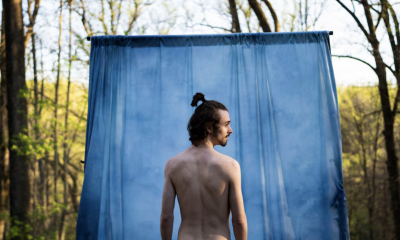Arts & Entertainment
High notes for ‘Show Boat’
Opera singer Cambridge returns for fourth appearance with WNO

‘Show Boat’
Opens Saturday, runs through May 26
Washington National Opera
Kennedy Center Opera House
(2700 F Street, NW)
$25-$270
kennedy-center.org

Soprano Alyson Cambridge says she’s thrilled to bring ‘Show Boat’ to her native Washington. (Photo by Enrique Vega; courtesy Bucklesweet Media)
D.C.-area native Alyson Cambridge starts a triumphant homecoming this weekend.
The former Arlington, Va., resident — she grew up here — has made a splash in the opera world with debuts at the Metropolitan Opera and other top-level houses in major productions. She opens Saturday in the classic musical “Show Boat,” the Kern/Hammerstein masterpiece that will feature more than 100 singers, actors and dancers on the Kennedy Center Opera House Stage to tell the story of a troupe of riverboat performers as they make their way through the decades. It features classic songs such as “Ol’ Man River” and “Can’t Help Lovin’ Dat Man.”
Cambridge stars as Julie. It will be a busy month for the performer. She’ll also sing the National Anthem at the Washington Nationals game on May 11. And on May 18, the production will be broadcast live to Nationals Park for WNO’s annual “Opera in the Outfield” event. Cambridge opened the show in Chicago last year and says during a lengthy phone chat from her home in Manhattan, she’s excited about bringing it to D.C. (Cambridge’s comments have been edited for length.)
BLADE: You still have family here?
CAMBRIDGE: Yes, my parents still live in the same house I grew up in and my brother and sister-in-law live in Falls Church with my niece who’s 1 so yeah, it’s been great spending time with my niece.
BLADE: How is the art/theater/music vibe different in New York versus Washington?
CAMBRIDGE: New York is a completely different world. I’ve been there almost 11 years so it feels like home now and I’m used to a fast-paced life where I’m constantly being surrounded by artists, singers, actors and dancers all the time. The person behind the counter at Starbucks is an aspiring acturess. It’s just in the culture that there’s this assumption that you have some ties to the arts. You just feel that vibe all the time here.
BLADE: How was the Chicago run?
CAMBRIDGE: Really wonderful. It was the first time for many of us coming to this show .. and my first time doing a musical like this on such a grand scale. About half the cast is new for D.C. and it’s been wonderful welcoming so many newcomers to this production. I can truly say, there’s not a weak link in the cast, everybody is just so strong. … I hope D.C. embraces the show as much as Chicago did. We were completely sold out there and it was the toughest ticket in town to get.
BLADE: Most of your professional work has been in opera. Are the lines blurring between the opera world and musical theater and if so, is that a good thing?
CAMBRIDGE: I’ve seen a lot of change just within the last four years or so. I did “Porgy & Bess” in Washington in 2005 and came back in 2010 and the reception was very different. It’s considered a show in the more operatic vein and was really written for classically trained voices. Even just a few years ago, people warned me, ‘Oh, be careful — if you start with that, people won’t see you as a truly legit opera singer,’ but I think what we’re doing is really opening up these musical worlds to different audiences and I think it’s the perfect blend.
BLADE: Whatever raw talent you were blest with, as you discovered it and what your strengths were, did that line up pretty naturally with your musical interests as a teen or did you have to learn to appreciate opera, which can be an acquired taste?
CAMBRIDGE: Oh, back in the ‘90s I listened to pop singers and wanted to be a pop singer. I’d be blasting Christina Aguilera out of my car on campus but I discovered I could imitate any voice I heard and had a really finely tuned ear. My mom would have classical music on and I could imitate the opera singers and we had a neighbor say once, ‘You know, that’s not half bad.’ … This led to voice lessons … where I was eventually told I had natural ability in this genre. But yes, it took awhile for me to really embrace what my voice was meant to do. But yeah, Madonna, Whitney Houston, Tiffany, I loved all that too and even went through a rap phase.
BLADE: Does it feel really competitive and cut throat as your career unfolds or is there a level you get to where you don’t feel like the next soprano is just waiting in the wings snapping at your heels?
CAMBRIDGE: I think everybody has their own unique path. Mine was pretty fast. I literally went from Curtis to the Metropolitan Opera’s young artist program by the time I was 23 and had my Met debut at 24, but I have certainly leanred you’re always a work in progress and I think it’s a misconception that you don’t have to keep learning. … It’s very much about always coming out and bringing your A game.
BLADE: What is your tessitura?
CAMBRIDGE: I’m a full lyric soprano.
BLADE: Is that the highest one? I can never remember.
CAMBRIDGE: No, a coloratura is the highest and the lightest … It’s a fuller sound with more meat to it. … The role of Julie, is really a mezzo role. It’s quite low but it suits me quite well.
BLADE: Do you have a gay best friend in New York? Your world must be teeming with gay energy.
CAMBRIDGE: It’s all over the map. I’m surrounded by gay people, trans people, bi — everything. It’s really all across the map. But yeah, I’m going to the wedding of one of my college best friends this summer in New York. She was straight all through college but she’s marrying a woman and she’s never been happier.
Sports
US wins Olympic gold medal in women’s hockey
Team captain Hilary Knight proposed to girlfriend on Wednesday

The U.S. women’s hockey team on Thursday won a gold medal at the Milan Cortina Winter Olympics.
Team USA defeated Canada 2-1 in overtime. The game took place a day after Team USA captain Hilary Knight proposed to her girlfriend, Brittany Bowe, an Olympic speed skater.
Cayla Barnes and Alex Carpenter — Knight’s teammates — are also LGBTQ. They are among the more than 40 openly LGBTQ athletes who are competing in the games.
The Olympics will end on Sunday.
Movies
Radical reframing highlights the ‘Wuthering’ highs and lows of a classic
Emerald Fennell’s cinematic vision elicits strong reactions

If you’re a fan of “Wuthering Heights” — Emily Brontë’s oft-filmed 1847 novel about a doomed romance on the Yorkshire moors — it’s a given you’re going to have opinions about any new adaptation that comes along, but in the case of filmmaker Emerald Fennell’s new cinematic vision of this venerable classic, they’re probably going to be strong ones.
It’s nothing new, really. Brontë’s book has elicited controversy since its first publication, when it sparked outrage among Victorian readers over its tragic tale of thwarted lovers locked into an obsessive quest for revenge against each other, and has continued to shock generations of readers with its depictions of emotional cruelty and violent abuse, its dysfunctional relationships, and its grim portrait of a deeply-embedded class structure which perpetuates misery at every level of the social hierarchy.
It’s no wonder, then, that Fennell’s adaptation — a true “fangirl” appreciation project distinguished by the radical sensibilities which the third-time director brings to the mix — has become a flash point for social commentators whose main exposure to the tale has been flavored by decades of watered-down, romanticized “reinventions,” almost all of which omit large portions of the novel to selectively shape what’s left into a period tearjerker about star-crossed love, often distancing themselves from the raw emotional core of the story by adhering to generic tropes of “gothic romance” and rarely doing justice to the complexity of its characters — or, for that matter, its author’s deeper intentions.
Fennell’s version doesn’t exactly break that pattern; she, too, elides much of the novel’s sprawling plot to focus on the twisted entanglement between Catherine Earnshaw (Margot Robbie), daughter of the now-impoverished master of the titular estate (Martin Clunes), and Heathcliff (Jacob Elordi), a lowborn child of unknown background origin that has been “adopted” by her father as a servant in the household. Both subjected to the whims of the elder Earnshaw’s violent temper, they form a bond of mutual support in childhood which evolves, as they come of age, into something more; yet regardless of her feelings for him, Cathy — whose future status and security are at risk — chooses to marry Edgar Linton (Shazad Latif), the financially secure new owner of a neighboring estate. Heathcliff, devastated by her betrayal, leaves for parts unknown, only to return a few years later with a mysteriously-obtained fortune. Imposing himself into Cathy’s comfortable-but-joyless matrimony, he rekindles their now-forbidden passion and they become entwined in a torrid affair — even as he openly courts Linton’s naive ward Isabella (Alison Oliver) and plots to destroy the entire household from within. One might almost say that these two are the poster couple for the phrase “it’s complicated.” and it’s probably needless to say things don’t go well for anybody involved.
While there is more than enough material in “Wuthering Heights” that might easily be labeled as “problematic” in our contemporary judgments — like the fact that it’s a love story between two childhood friends, essentially raised as siblings, which becomes codependent and poisons every other relationship in their lives — the controversy over Fennell’s version has coalesced less around the content than her casting choices. When the project was announced, she drew criticism over the decision to cast Robbie (who also produced the film) opposite the younger Elordi. In the end, the casting works — though the age gap might be mildly distracting for some, both actors deliver superb performances, and the chemistry they exude soon renders it irrelevant.
Another controversy, however, is less easily dispelled. Though we never learn his true ethnic background, Brontë’s original text describes Heathcliff as having the appearance of “a dark-skinned gipsy” with “black fire” in his eyes; the character has typically been played by distinctly “Anglo” men, and consequently, many modern observers have expressed disappointment (and in some cases, full-blown outrage) over Fennel’s choice to use Elordi instead of putting an actor of color for the part, especially given the contemporary filter which she clearly chose for her interpretation for the novel.
In fact, it’s that modernized perspective — a view of history informed by social criticism, economic politics, feminist insight, and a sexual candor that would have shocked the prim Victorian readers of Brontë’s novel — that turns Fennell’s visually striking adaptation into more than just a comfortably romanticized period costume drama. From her very opening scene — a public hanging in the village where the death throes of the dangling body elicit lurid glee from the eagerly-gathered crowd — she makes it oppressively clear that the 18th-century was not a pleasant time to live; the brutality of the era is a primal force in her vision of the story, from the harrowing abuse that forges its lovers’ codependent bond, to the rigidly maintained class structure that compels even those in the higher echelons — especially women — into a kind of slavery to the system, to the inequities that fuel disloyalty among the vulnerable simply to preserve their own tenuous place in the hierarchy. It’s a battle for survival, if not of the fittest then of the most ruthless.
At the same time, she applies a distinctly 21st-century attitude of “sex-positivity” to evoke the appeal of carnality, not just for its own sake but as a taste of freedom; she even uses it to reframe Heathcliff’s cruel torment of Isabella by implying a consensual dom/sub relationship between them, offering a fragment of agency to a character typically relegated to the role of victim. Most crucially, of course, it permits Fennell to openly depict the sexuality of Cathy and Heathcliff as an experience of transgressive joy — albeit a tormented one — made perhaps even more irresistible (for them and for us) by the sense of rebellion that comes along with it.
Finally, while this “Wuthering Heights” may not have been the one to finally allow Heathcliff’s ambiguous racial identity to come to the forefront, Fennell does employ some “color-blind” casting — Latif is mixed-race (white and Pakistani) and Hong Chau, understated but profound in the crucial role of Nelly, Cathy’s longtime “paid companion,” is of Vietnamese descent — to illuminate the added pressures of being an “other” in a world weighted in favor of sameness.
Does all this contemporary hindsight into the fabric of Brontë’s epic novel make for a quintessential “Wuthering Heights?” Even allowing that such a thing were possible, probably not. While it presents a stylishly crafted and thrillingly cinematic take on this complex classic, richly enhanced by a superb and adventurous cast, it’s not likely to satisfy anyone looking for a faithful rendition, nor does it reveal a new angle from which the “romance” at its center looks anything other than toxic — indeed, it almost fetishizes the dysfunction. Even without the thorny debate around Heathcliff’s racial identity, there’s plenty here to prompt purists and revisionists alike to find fault with Fennell’s approach.
Yet for those looking for a new window into to this perennial classic, and who are comfortable with the radical flourish for which Fennell is already known, it’s an engrossing and intellectually stimulating exploration of this iconic story in a way that exchanges comfortable familiarity for unpredictable chaos — and for cinema fans, that’s more than enough reason to give “Wuthering Heights” a chance.
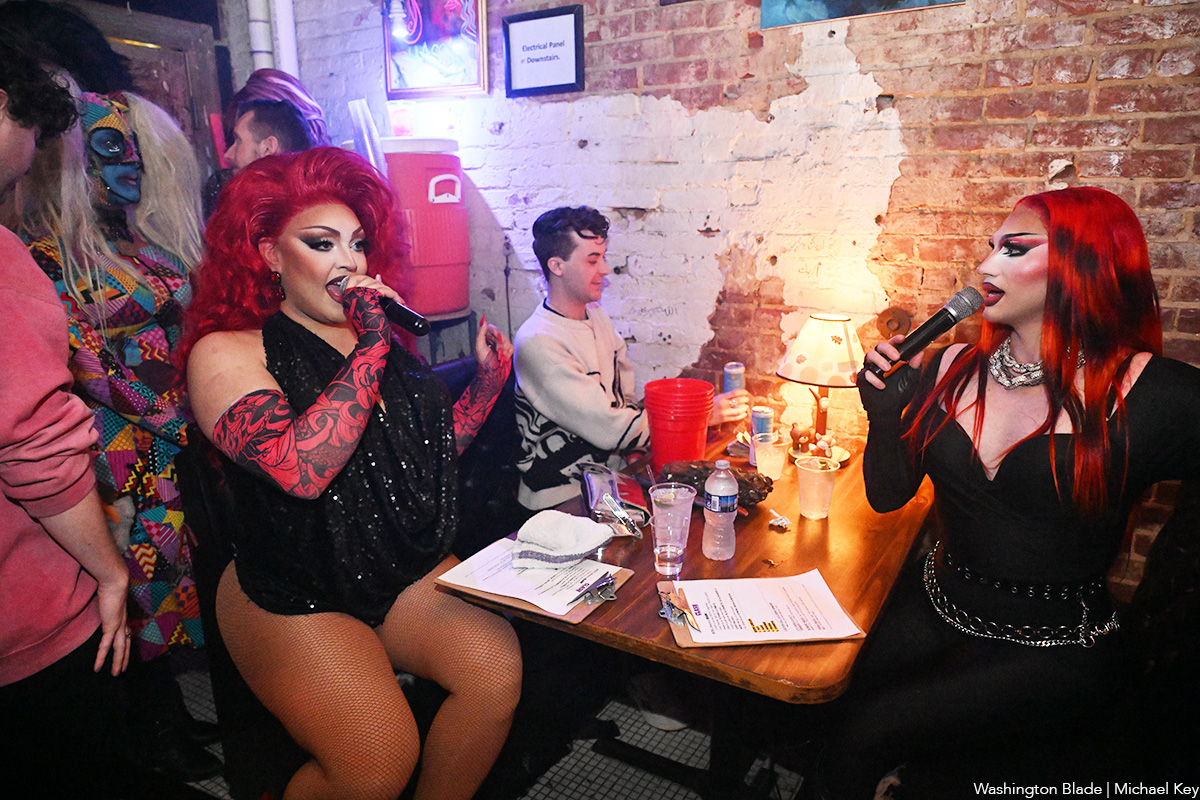
Crimsyn and Tatianna hosted the new weekly drag show Clash at Trade (1410 14th Street, N.W.) on Feb. 14, 2026. Performers included Aave, Crimsyn, Desiree Dik, and Tatianna.
(Washington Blade photos by Michael Key)
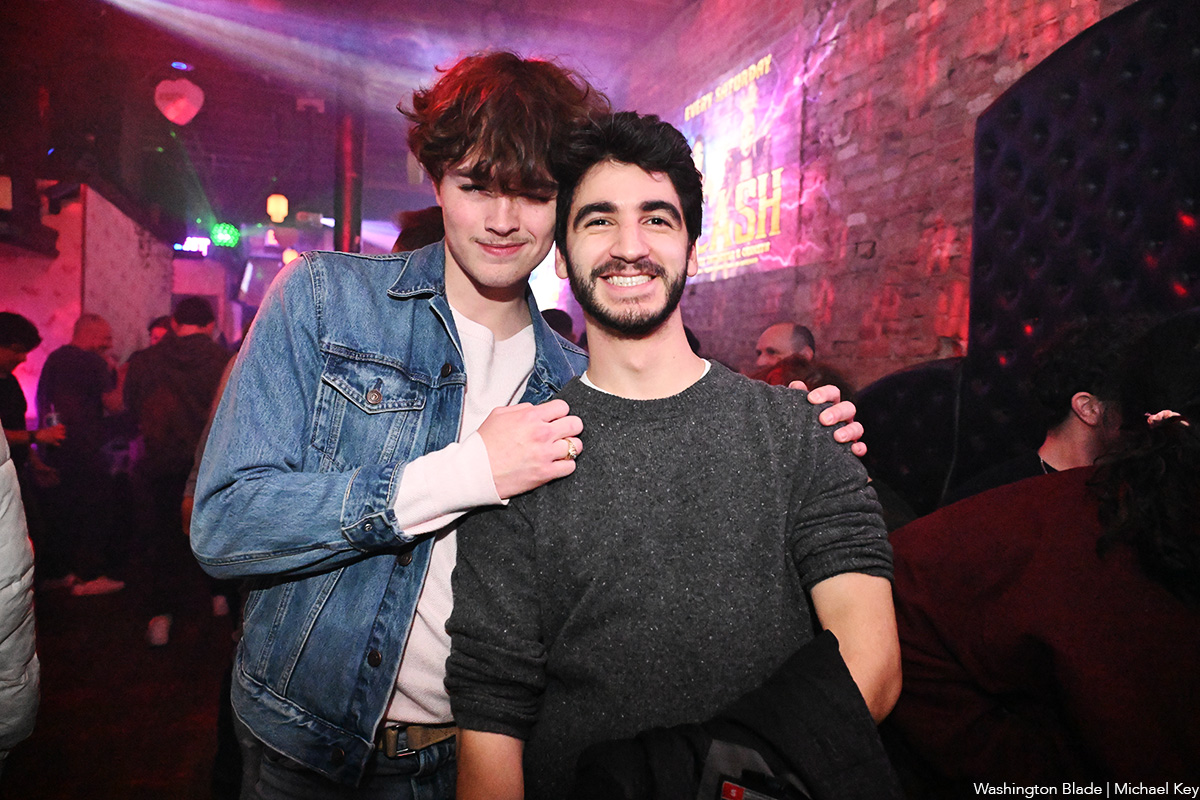
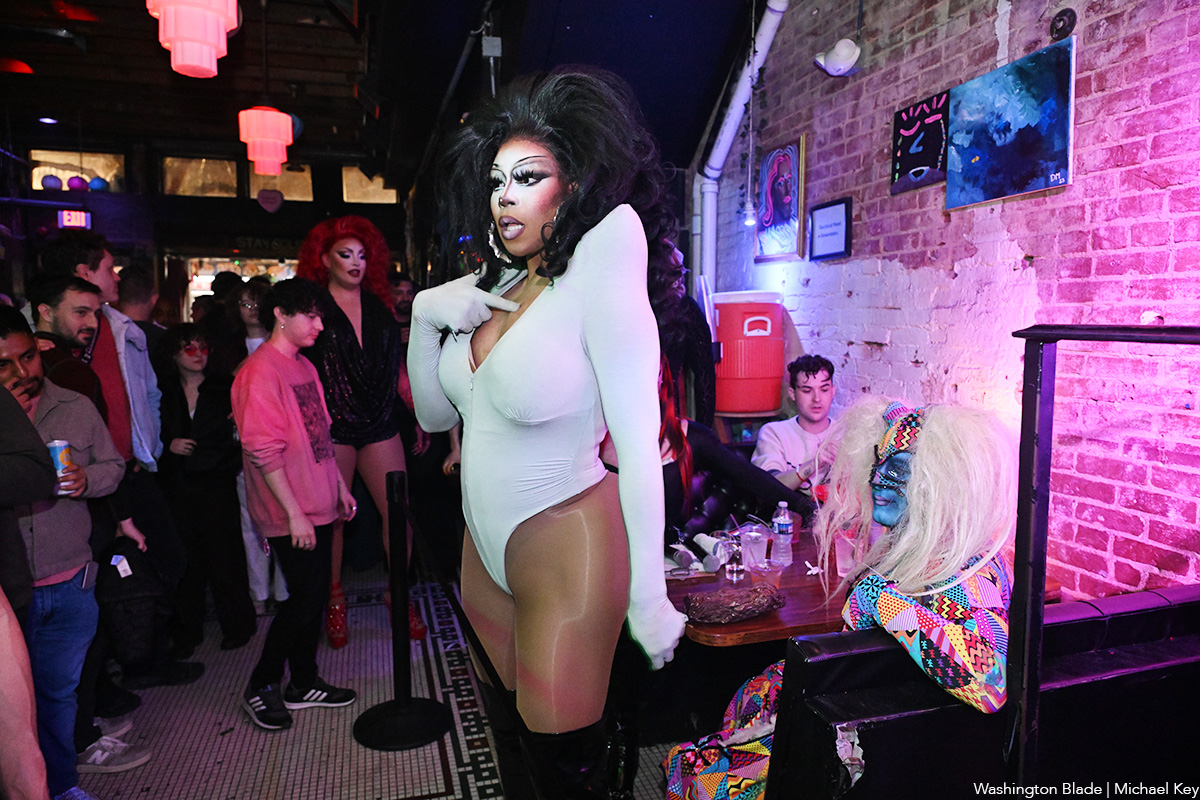
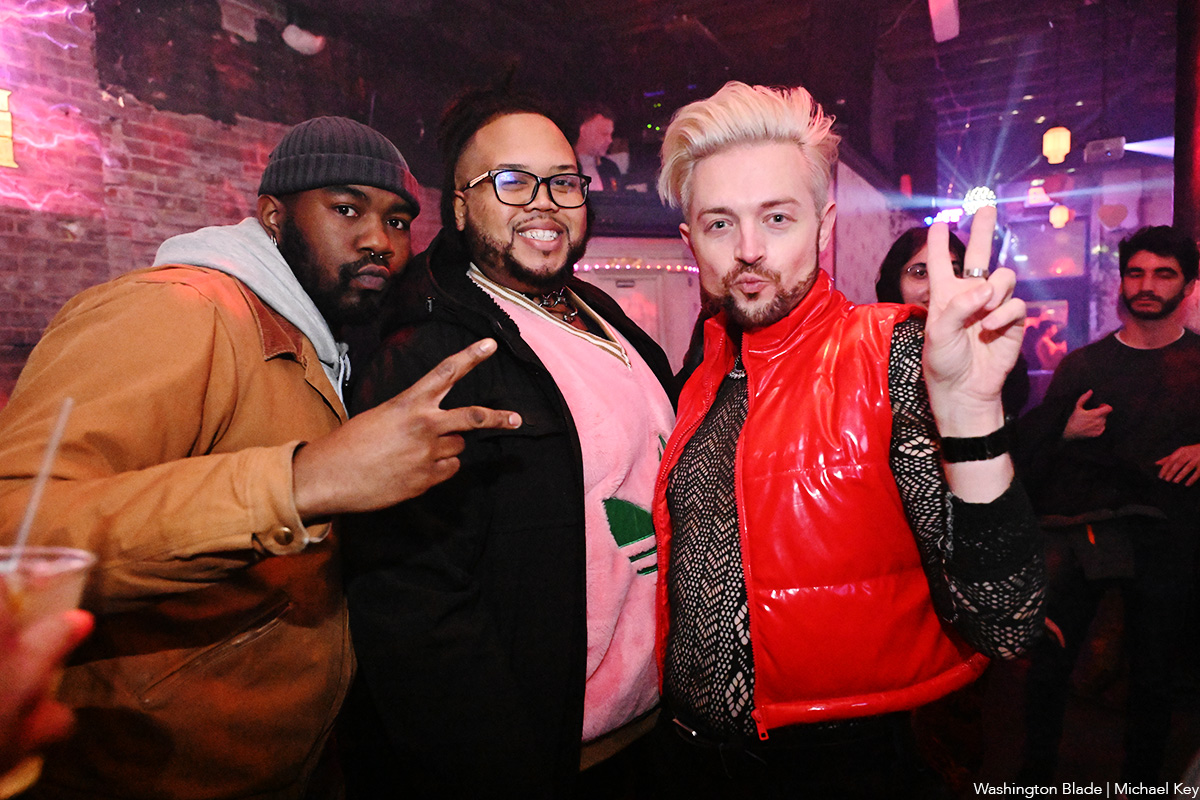
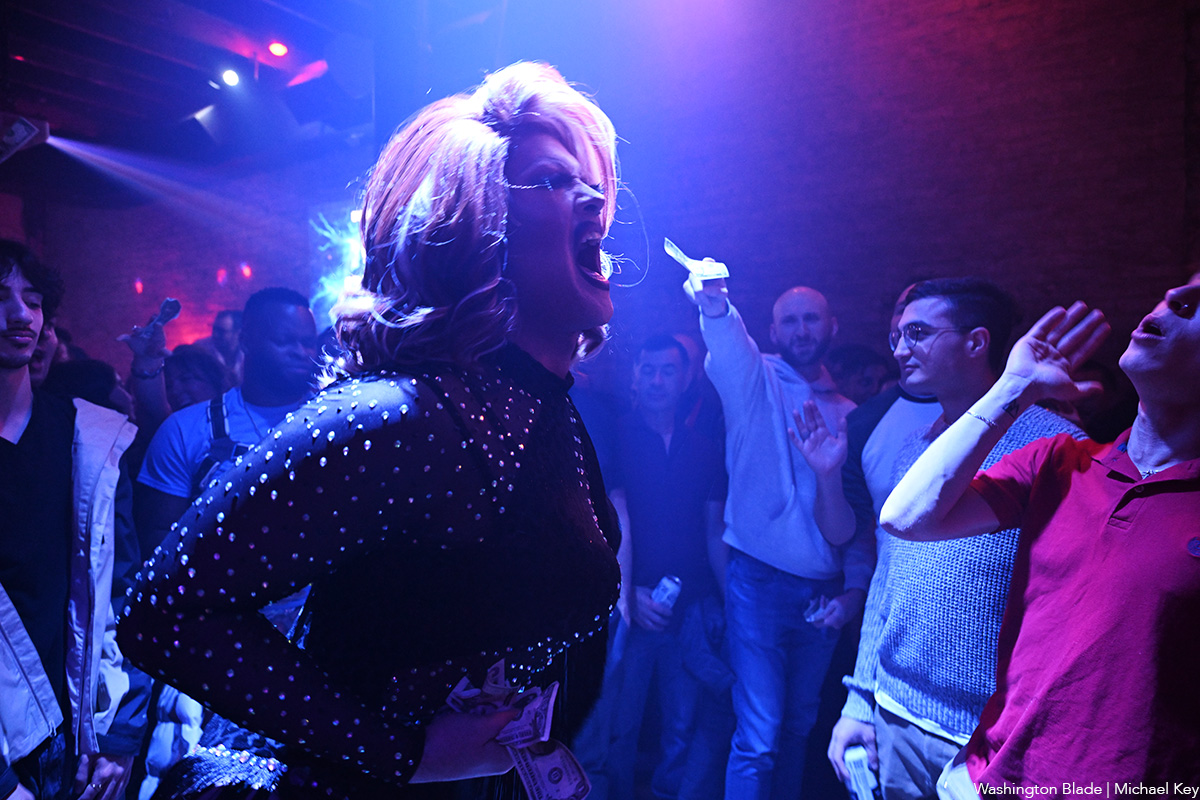

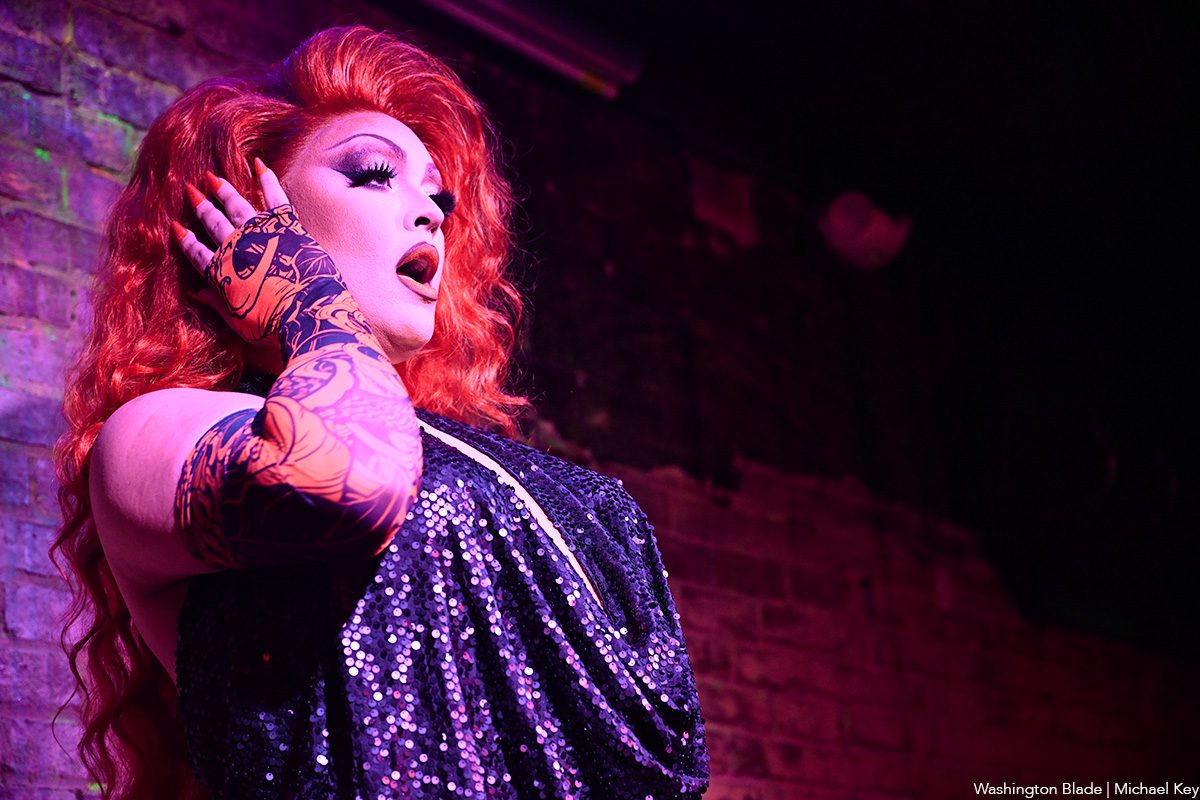
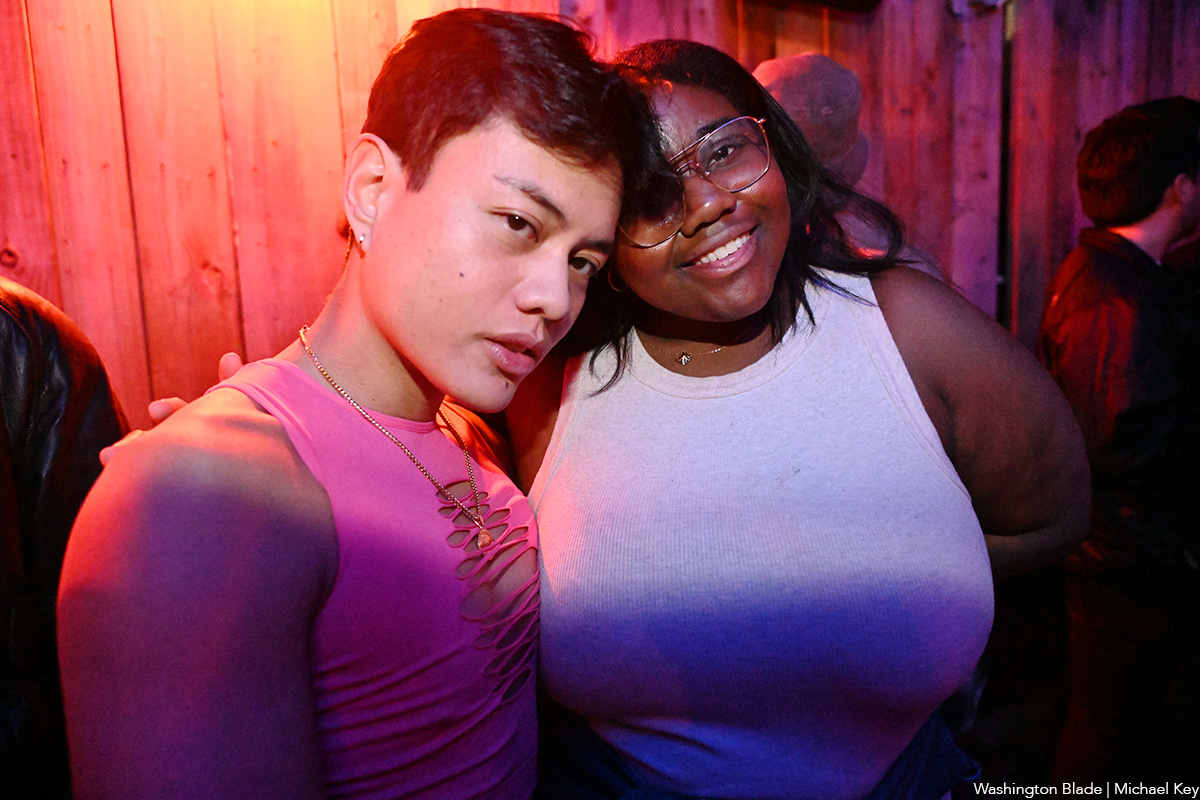
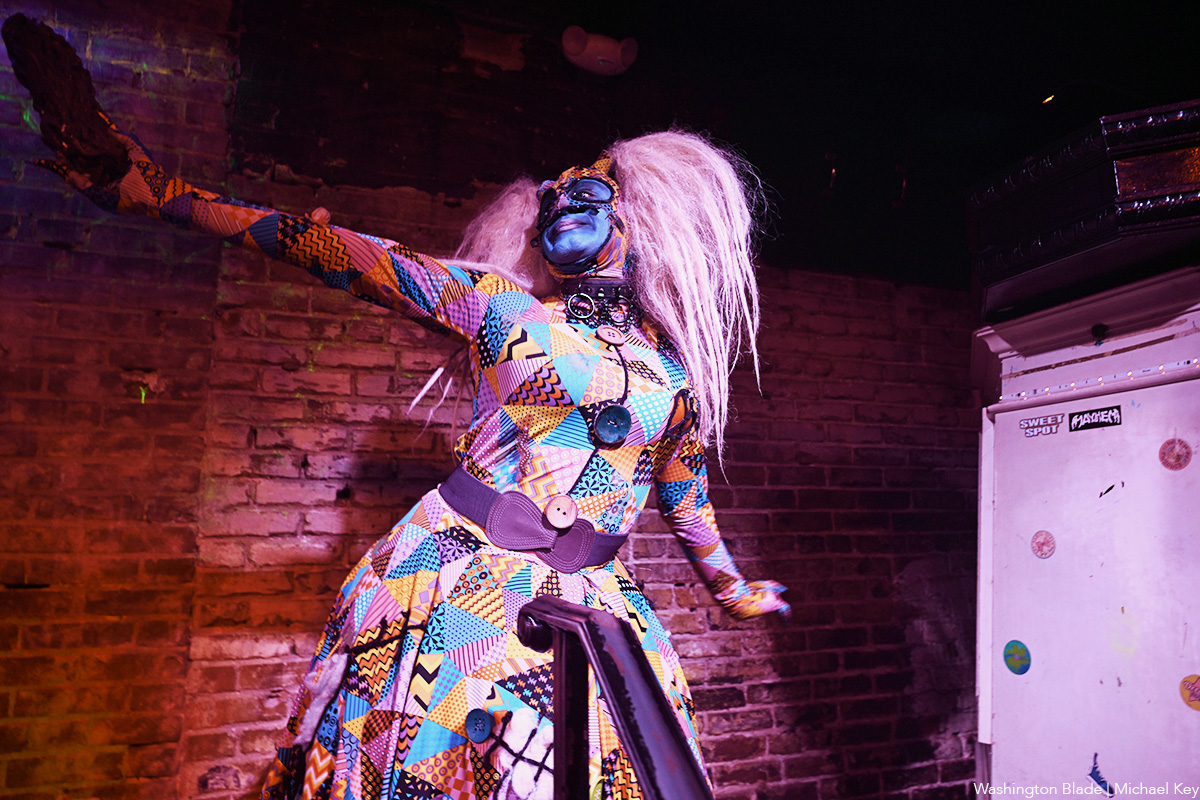
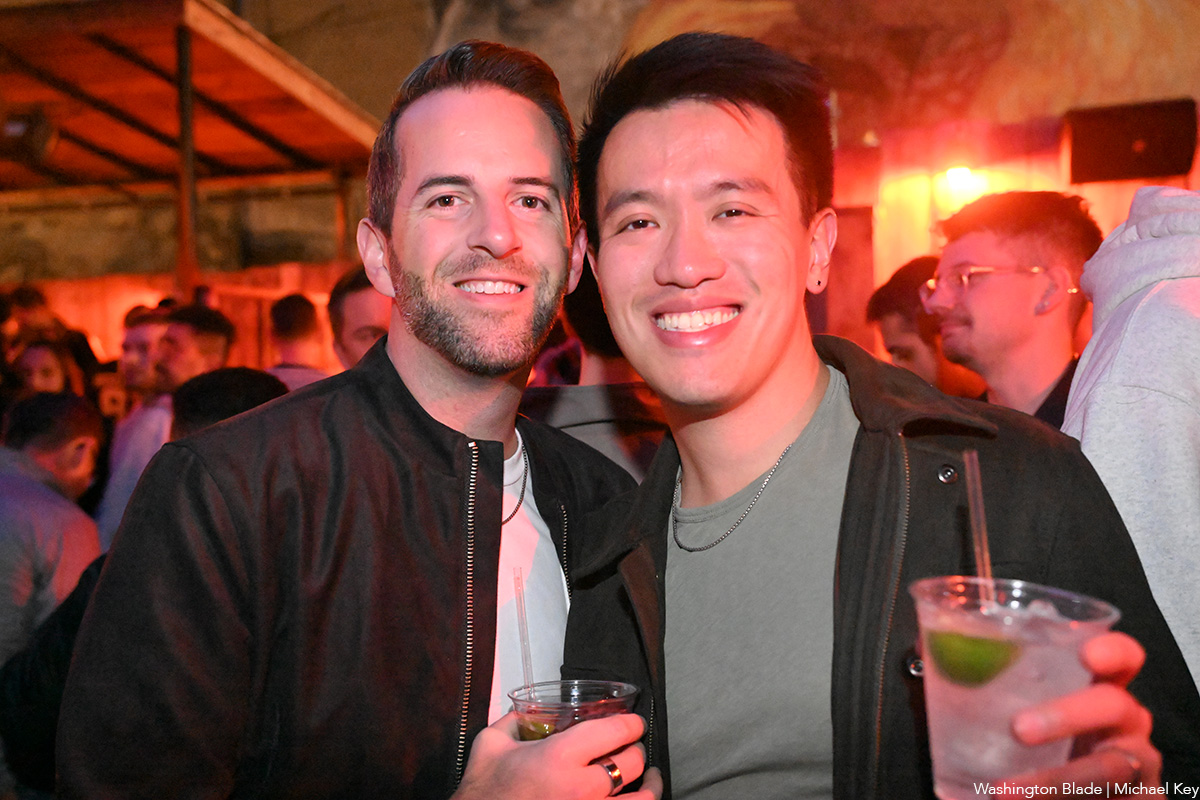
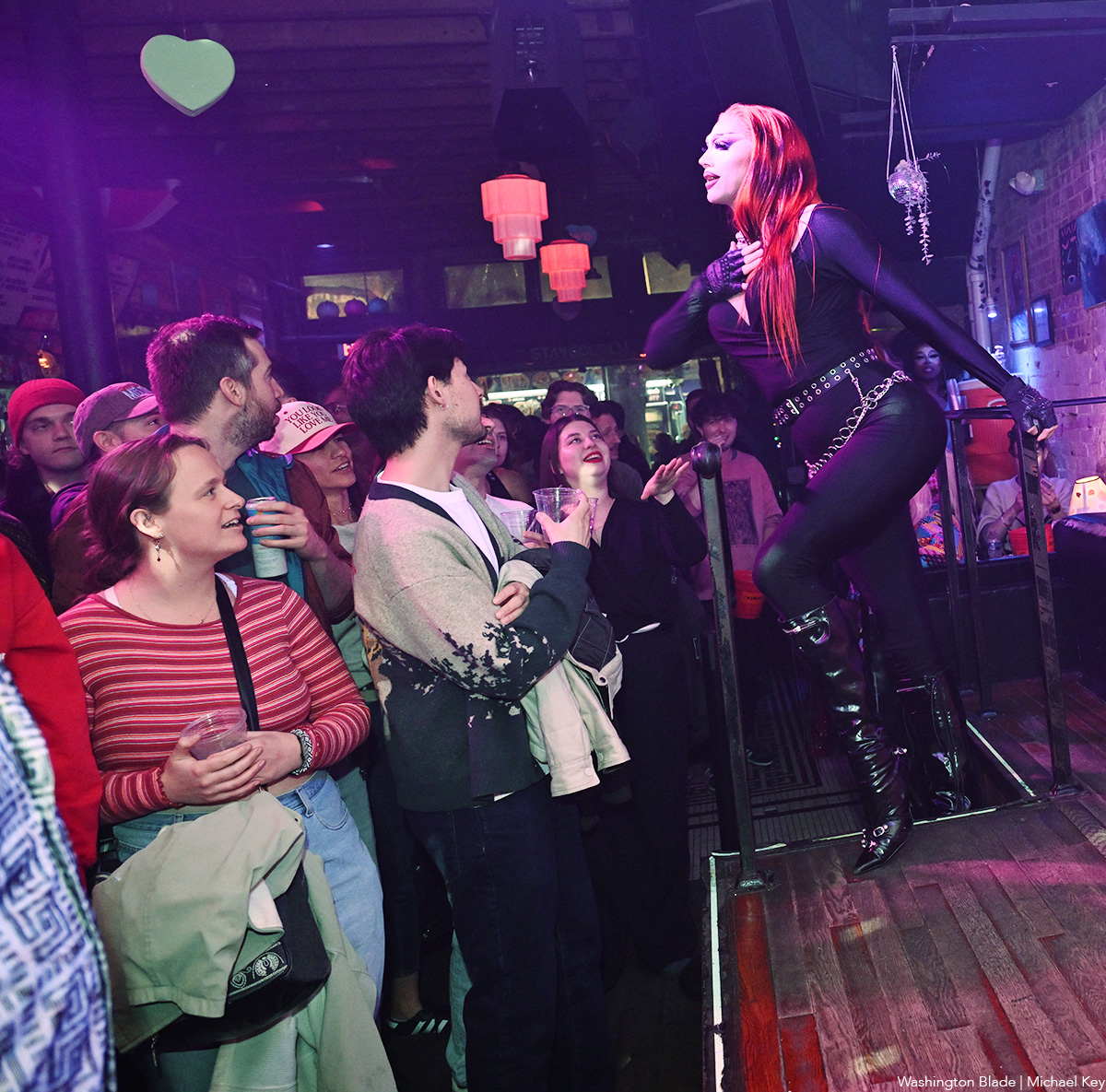

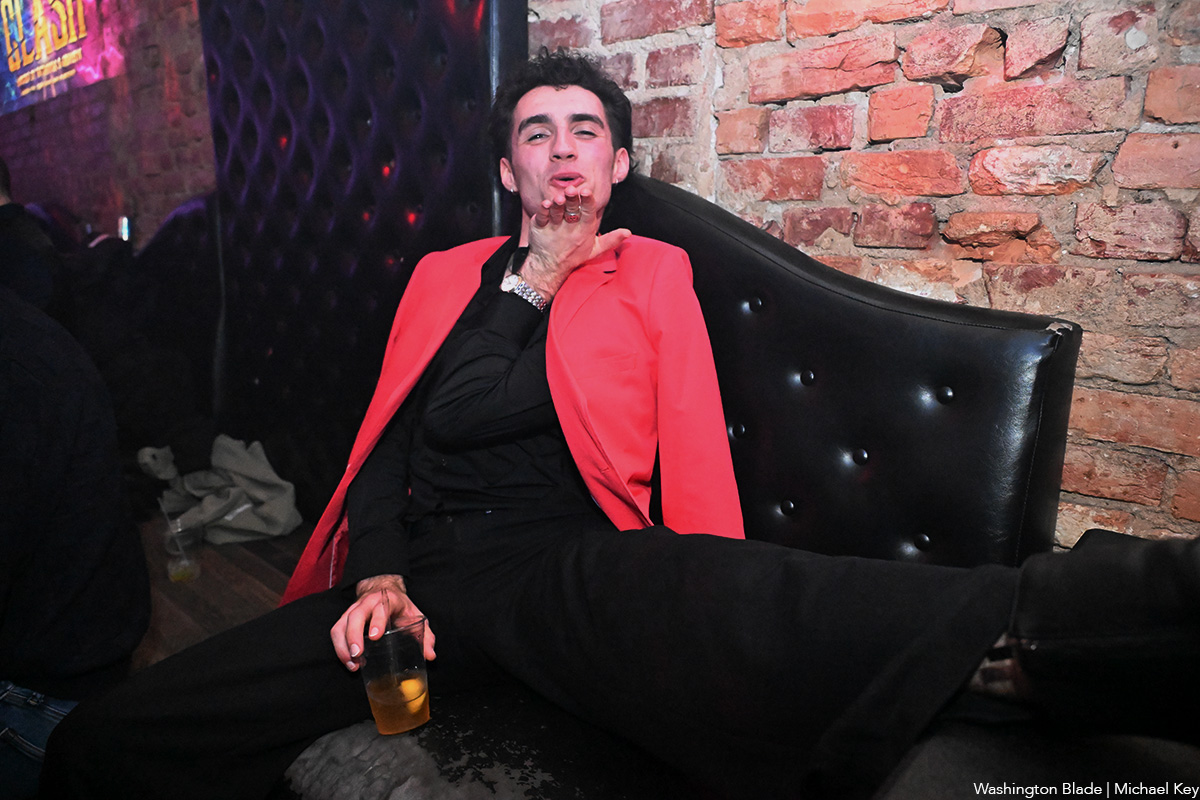
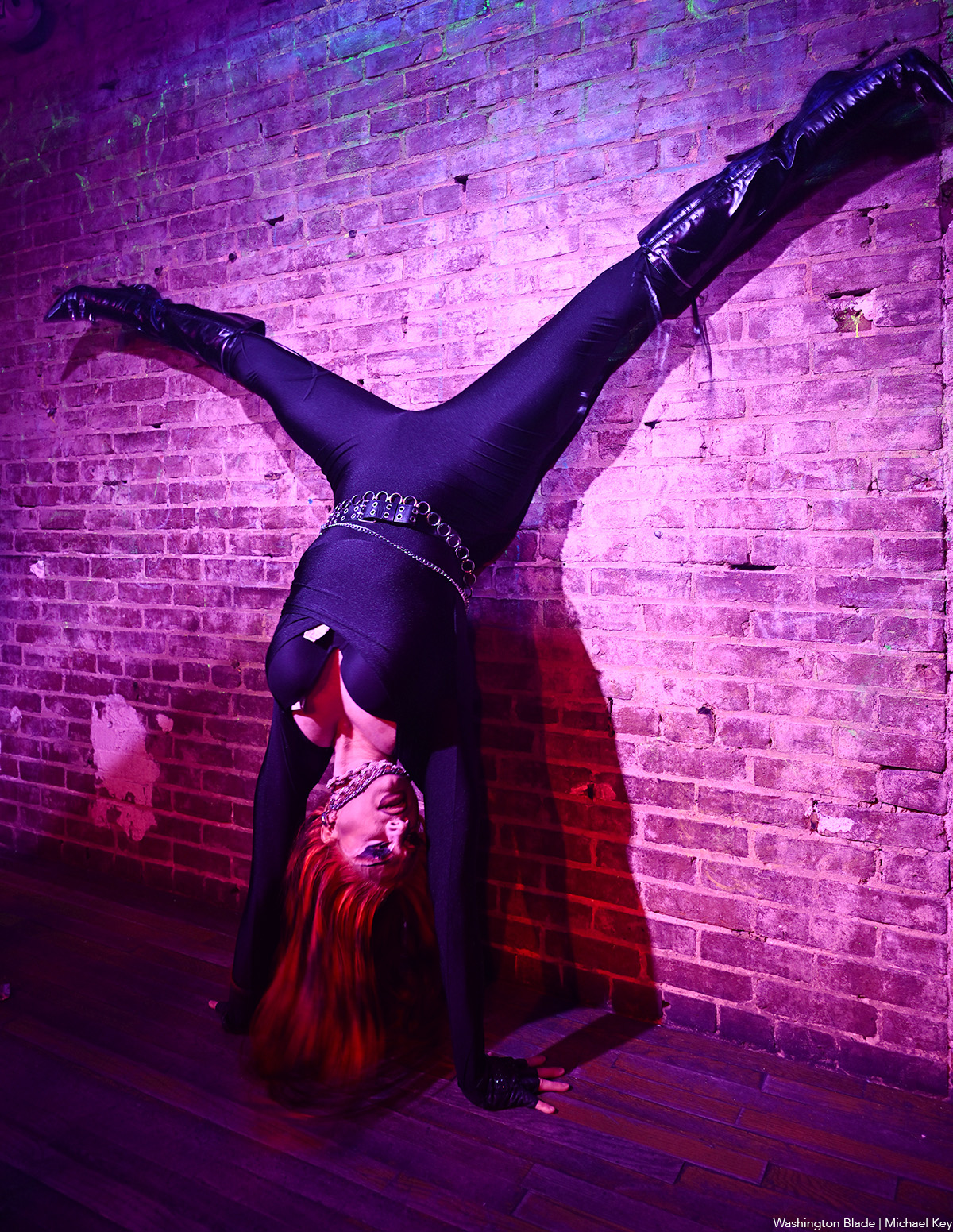
-

 Baltimore3 days ago
Baltimore3 days ago‘Heated Rivalry’ fandom exposes LGBTQ divide in Baltimore
-

 Real Estate3 days ago
Real Estate3 days agoHome is where the heart is
-

 District of Columbia3 days ago
District of Columbia3 days agoDeon Jones speaks about D.C. Department of Corrections bias lawsuit settlement
-

 European Union3 days ago
European Union3 days agoEuropean Parliament resolution backs ‘full recognition of trans women as women’





